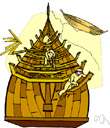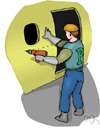con·struct
(kən-strŭkt′)tr.v. con·struct·ed, con·struct·ing, con·structs
1. To form by assembling or combining parts; build.
2. To create (an argument or a sentence, for example) by systematically arranging ideas or terms.
3. Mathematics To draw (a geometric figure) that meets specific requirements.
n. (kŏn′strŭkt′)
1. Something formed or constructed from parts.
2.
a. A concept, model, or schematic idea: a theoretical construct of the atom.
b. A concrete image or idea: "[He] began to shift focus from the haunted constructs of terror in his early work" (Stephen Koch).
[Latin cōnstruere, cōnstrūct- : com-, com- + struere, to pile up; see ster- in Indo-European roots.]
con·struct′i·ble adj.
con·struc′tor, con·struct′er n.
American Heritage® Dictionary of the English Language, Fifth Edition. Copyright © 2016 by Houghton Mifflin Harcourt Publishing Company. Published by Houghton Mifflin Harcourt Publishing Company. All rights reserved.
construct
vb (tr)
1. to put together substances or parts, esp systematically, in order to make or build (a building, bridge, etc); assemble
2. to compose or frame mentally (an argument, sentence, etc)
3. (Mathematics) geometry to draw (a line, angle, or figure) so that certain requirements are satisfied
n
4. something formulated or built systematically
5. a complex idea resulting from a synthesis of simpler ideas
6. (Psychology) psychol a model devised on the basis of observation, designed to relate what is observed to some theoretical framework
[C17: from Latin constructus piled up, from construere to heap together, build, from struere to arrange, erect]
conˈstructible adj
conˈstructor, conˈstructer n
Collins English Dictionary – Complete and Unabridged, 12th Edition 2014 © HarperCollins Publishers 1991, 1994, 1998, 2000, 2003, 2006, 2007, 2009, 2011, 2014
con•struct
(v. kənˈstrʌkt; n. ˈkɒn strʌkt)v.t.
1. to build or form by putting together parts.
2. Geom. to draw (a figure) fulfilling certain given conditions.
n. 3. something constructed.
4. an image, idea, or theory, esp. a complex one formed from a number of simpler elements.
[1655–65; < Latin constrūctus, past participle of construere; see construe]
con•struct′i•ble, adj.
con•struc′tor, con•struct′er, n.
Random House Kernerman Webster's College Dictionary, © 2010 K Dictionaries Ltd. Copyright 2005, 1997, 1991 by Random House, Inc. All rights reserved.
construct
Past participle: constructed
Gerund: constructing
| Imperative |
|---|
| construct |
| construct |
Collins English Verb Tables © HarperCollins Publishers 2011
ThesaurusAntonymsRelated WordsSynonymsLegend:
| Noun | 1. | construct - an abstract or general idea inferred or derived from specific instances idea, thought - the content of cognition; the main thing you are thinking about; "it was not a good idea"; "the thought never entered my mind" notion - a general inclusive concept category - a general concept that marks divisions or coordinations in a conceptual scheme rule, regulation - a principle or condition that customarily governs behavior; "it was his rule to take a walk before breakfast"; "short haircuts were the regulation" attribute, dimension, property - a construct whereby objects or individuals can be distinguished; "self-confidence is not an endearing property" abstract, abstraction - a concept or idea not associated with any specific instance; "he loved her only in the abstract--not in person" quantity - the concept that something has a magnitude and can be represented in mathematical expressions by a constant or a variable division, section, part - one of the portions into which something is regarded as divided and which together constitute a whole; "the written part of the exam"; "the finance section of the company"; "the BBC's engineering division" whole - all of something including all its component elements or parts; "Europe considered as a whole"; "the whole of American literature" natural law, law - a rule or body of rules of conduct inherent in human nature and essential to or binding upon human society law of nature, law - a generalization that describes recurring facts or events in nature; "the laws of thermodynamics" lexicalized concept - a concept that is expressed by a word (in some particular language) hypothesis, theory, possibility - a tentative insight into the natural world; a concept that is not yet verified but that if true would explain certain facts or phenomena; "a scientific hypothesis that survives experimental testing becomes a scientific theory"; "he proposed a fresh theory of alkalis that later was accepted in chemical practices" fact - a concept whose truth can be proved; "scientific hypotheses are not facts" linguistic rule, rule - (linguistics) a rule describing (or prescribing) a linguistic practice |
| Verb | 1. |  construct - make by combining materials and parts; "this little pig made his house out of straw"; "Some eccentric constructed an electric brassiere warmer" construct - make by combining materials and parts; "this little pig made his house out of straw"; "Some eccentric constructed an electric brassiere warmer"revet - construct a revetment dry-wall - construct with drywall; "dry-wall the basement of the house" lock - build locks in order to facilitate the navigation of vessels wattle - build of or with wattle rebuild, reconstruct - build again; "The house was rebuild after it was hit by a bomb" groin - build with groins; "The ceiling was groined" cantilever - construct with girders and beams such that only one end is fixed; "Frank Lloyd Wright liked to cantilever his buildings" build - be engaged in building; "These architects build in interesting and new styles" corduroy - build (a road) from logs laid side by side channelise, channelize - make a channel for; provide with a channel; "channelize the country for better transportation" |
| 2. |  construct - put together out of artificial or natural components or parts; "the company fabricates plastic chairs"; "They manufacture small toys"; He manufactured a popular cereal" construct - put together out of artificial or natural components or parts; "the company fabricates plastic chairs"; "They manufacture small toys"; He manufactured a popular cereal"mass-produce - produce on a large scale make - make by shaping or bringing together constituents; "make a dress"; "make a cake"; "make a wall of stones" raft - make into a raft; "raft these logs" | |
| 3. | construct - draw with suitable instruments and under specified conditions; "construct an equilateral triangle" geometry - the pure mathematics of points and lines and curves and surfaces | |
| 4. | construct - create by linking linguistic units; "construct a sentence"; "construct a paragraph" create by mental act, create mentally - create mentally and abstractly rather than with one's hands | |
| 5. | construct - create by organizing and linking ideas, arguments, or concepts; "construct a proof"; "construct an argument" create by mental act, create mentally - create mentally and abstractly rather than with one's hands | |
| 6. | construct - reassemble mentally; "reconstruct the events of 20 years ago" hypothesise, hypothesize, speculate, conjecture, theorise, theorize, hypothecate, suppose - to believe especially on uncertain or tentative grounds; "Scientists supposed that large dinosaurs lived in swamps" etymologise, etymologize - construct the history of words |
Based on WordNet 3.0, Farlex clipart collection. © 2003-2012 Princeton University, Farlex Inc.
construct
verb
1. build, make, form, create, design, raise, establish, set up, fashion, shape, engineer, frame, manufacture, put up, assemble, put together, erect, fabricate The boxes should be constructed from rough-sawn timber.
build level, destroy, devastate, dismantle, demolish, flatten, knock down, pull down, tear down, bulldoze, raze
build level, destroy, devastate, dismantle, demolish, flatten, knock down, pull down, tear down, bulldoze, raze
Collins Thesaurus of the English Language – Complete and Unabridged 2nd Edition. 2002 © HarperCollins Publishers 1995, 2002
construct
verb1. To create by forming, combining, or altering materials:
The American Heritage® Roget's Thesaurus. Copyright © 2013, 2014 by Houghton Mifflin Harcourt Publishing Company. Published by Houghton Mifflin Harcourt Publishing Company. All rights reserved.
Translations
يَبْني، يُقيم، يُشيديُنْشِئُ
budovatpostavitsestavittvořit
konstruerebygge
ehitamakoostama
rakentaa
izgraditi
megalkot
byggja, setja saman
建設する
건설하다
konstrukcijakonstruktoriuskonstruktyviaikonstruktyvuskonstruoti
būvētceltkonstruētsastādīt
graditi
konstruera
สร้าง
xây dựng
Collins Spanish Dictionary - Complete and Unabridged 8th Edition 2005 © William Collins Sons & Co. Ltd. 1971, 1988 © HarperCollins Publishers 1992, 1993, 1996, 1997, 2000, 2003, 2005
construct
[kənˈstrʌkt] vt [+ building, road, machine] → construire
[+ theory, system, book] → construire
Collins English/French Electronic Resource. © HarperCollins Publishers 2005
construct
vt → bauen; bridge, machine also → konstruieren; (Geometry) → konstruieren; sentence → bilden, konstruieren; novel, play etc → aufbauen; theory → entwickeln, konstruieren
n → Gedankengebäude nt
Collins German Dictionary – Complete and Unabridged 7th Edition 2005. © William Collins Sons & Co. Ltd. 1980 © HarperCollins Publishers 1991, 1997, 1999, 2004, 2005, 2007
Collins Italian Dictionary 1st Edition © HarperCollins Publishers 1995
construct
(kənˈstrakt) verb to build; to put together. They are planning to construct a new supermarket near our house; Construct a sentence containing `although'.
conˈstruction (-ʃən) noun1. (a way of) constructing or putting together. The bridge is still under construction.
2. something built. That construction won't last long.
conˈstructive (-tiv) adjective helpful; having to do with making, not with destroying. Constructive criticism tells you both what is wrong and also what to do about it.
conˈstructively adverbconˈstructor noun
a person who constructs. a constructor of bridges.
construction site a building site.
construction worker a builder.
Kernerman English Multilingual Dictionary © 2006-2013 K Dictionaries Ltd.
construct
→ يُنْشِئُ postavit konstruere errichten κατασκευάζω construir rakentaa construire izgraditi costruire 建設する 건설하다 bouwen konstruere zbudować construir строить konstruera สร้าง yapmak xây dựng 建造Multilingual Translator © HarperCollins Publishers 2009